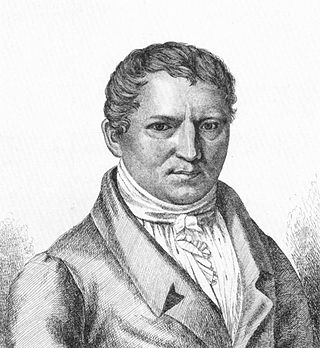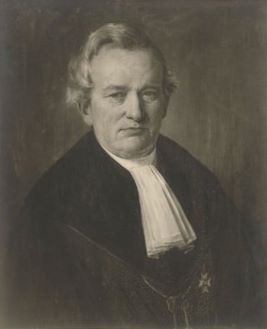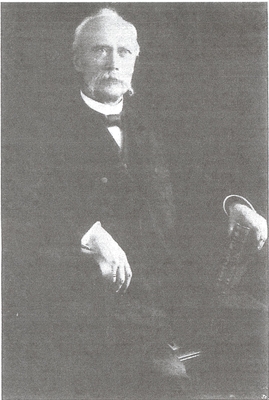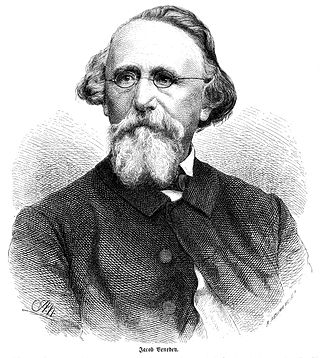
Ferdinand Walter (born at Wetzlar, 30 November 1794; died at Bonn, 13 December 1879) was a German jurist, member of the Prussian National Assembly and professor at the University of Bonn.

Ferdinand Walter (born at Wetzlar, 30 November 1794; died at Bonn, 13 December 1879) was a German jurist, member of the Prussian National Assembly and professor at the University of Bonn.
After studying at the Latin school of Mülheim on the Rhine (1805-9), and later at Cologne (1809-13), he fought against Napoleon I in 1814, as a volunteer in a Russian regiment. In autumn, 1814, he began to study jurisprudence at Heidelberg, where he graduated, 22 November 1817. He remained at Heidelberg as Privatdozent until Easter, 1819, where he was called to the newly founded University of Bonn. He taught various juristic branches there until 1875, when he resigned on account of blindness.
A layman, Walter was a strenuous champion of the rights of the Catholic Church against civil encroachment. He was a member of the Prussian National Assembly in 1848 and of the First Chamber of Deputies in 1849. In a special pamphlet (1848) he opposed the incorporation into the criminal code of an article allowing the State to deprive the clergy of ecclesiastical rights, and on 4 October 1849, he delivered an oration in defense of ecclesiastical independence in the management of church affairs.
His most famous work is his "Lehrbuch des Kirchenrechts" (Bonn, 1822) [Canon law textbook OCLC 258551471]. The eighth edition was translated into French and Spanish, the ninth into Italian. A fourteenth edition was prepared by Canon Gerlach, one of Walter's disciples (Bonn, 1871). The sources of canon law, which were added as an appendix to the sixth edition of the "Kirchenrecht", he materially enlarged and published separately as "Fontes juris ecclesiastici antiqui et hodierni" (Bonn, 1862). His other important works are: "Corpus juris Germanici antiqui" (3 vols., Bonn, 1824); "Romische Rechtsgeschichte" (Bonn, 1836); "Deutsche Rechtsgeschichte" (Bonn, 1853); "System des deutschen Privatrechts" (Bonn, 1855); "Das alte Wales", (Bonn, 1859), on the history, laws, and religion of ancient Wales; "Juristische Encyclopadic" (Bonn, 1856); "Naturrecht und Politik" (Bonn, 1863); "Aus meinem Leben" (Bonn, 1865), an autobiography; "Das alte Erz stift und die Reichsstadt Koln" (Bonn, 1866), a civil history of the former electorate of Cologne, left unfinished.
![]() This article incorporates text from a publication now in the public domain : Herbermann, Charles, ed. (1913). "Ferdinand Walter". Catholic Encyclopedia . New York: Robert Appleton Company.
This article incorporates text from a publication now in the public domain : Herbermann, Charles, ed. (1913). "Ferdinand Walter". Catholic Encyclopedia . New York: Robert Appleton Company.

Wilhelm Martin Leberecht de Wette was a German theologian and biblical scholar.

Karl Friedrich Eichhorn was a German jurist.

Friedrich Carl von Savigny was a German jurist and historian.

Joseph Hergenröther was a German Church historian and canonist, and the first Cardinal-Prefect of the Vatican Archive.
Paul Hinschius, German jurist, was the son of Franz Sales August Hinschius (1807–1877), and was born in Berlin.

Georg Friedrich Puchta was an important German Legal scholar.

Friedrich Bernard Christian Maassen was a German jurist, professor of law, and Roman Catholic scholar.
The Corpus Juris Canonici is a collection of significant sources of the Canon law of the Catholic Church that was applicable to the Latin Church. It was replaced by the 1917 Code of Canon Law which went into effect in 1918. The 1917 Code was later replaced by the 1983 Code of Canon Law, the codification of canon law currently in effect for the Latin Church.

Franz Xaver Dieringer was a Catholic theologian. He was a professor of dogma and homiletics at the University of Bonn.
Emil Albert Friedberg was a German canonist.

Peter Reichensperger was a German jurist and parliamentarian for Centre Party.

Franz Quirin von Kober was a German Roman Catholic priest, known as a canon lawyer and pedagogist.
Friedrich Heinrich Vering was a German canon lawyer, a defender of the Catholic Church against the State.

George Phillips was a German canon lawyer.

Peter Landau was a German jurist, legal historian and expert on canon law.

Gotthold Julius Rudolph Sohm was a German jurist and Church historian as well as a theologian. He published works concerning Roman and German law, Canon law and Church History.
Aemilius Ludwig Richter was a German jurist.
Franz Laurenz Joseph Maria Cantador or Franz Lorenz Joseph Maria Cantador was the commander of the Düsseldorf vigilance committee during the German revolutions of 1848–1849 and later was an officer leading a regiment in the Union Army during the American Civil War.

Jacob Venedey was a German revolutionary, journalist and writer.

Ulrich Stutz was a Swiss-German jurist and historian and pioneering scholar in the academic study of canon law. He is associated in particular with the theory of the proprietary church (Eigenkirche) and its role in the development of Christianity in medieval Europe.